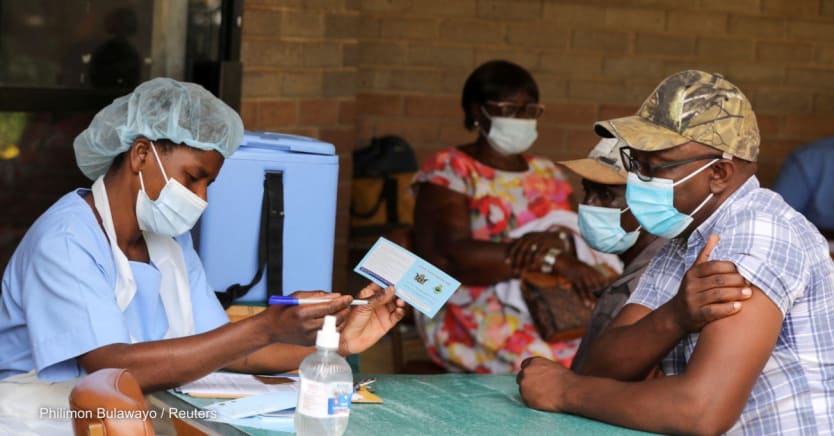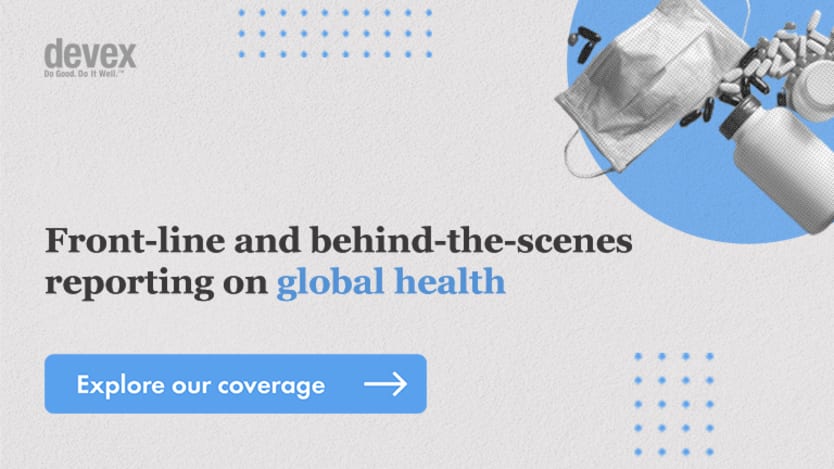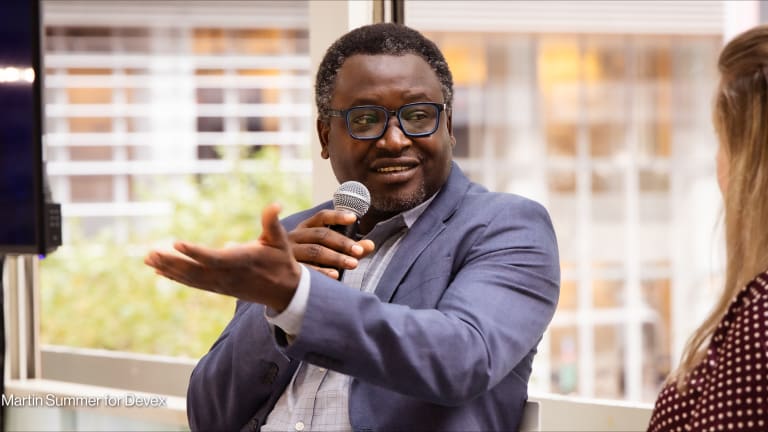
As a primary school teacher, Felix Malunga knows that he is vulnerable to COVID-19 infections due to his constant interactions with pupils. But Malunga — who has already been vaccinated — also believes that vaccination is an individual’s responsibility that should not be forced.
Sign up for Devex CheckUp
The must-read weekly newsletter for exclusive global health news and insider insights.
But starting this year, the Malawian government has made COVID-19 vaccination mandatory for front-line workers such as Malunga.
“Accumulating data continues to indicate that the majority of those being admitted to our emergency treatment units or losing their lives to COVID-19 have not been vaccinated,” said Khumbize Kandodo Chiponda Malawi’s health minister during a press briefing announcing the measure. “No one is safe until we all get fully vaccinated.”
Other African countries such as Ghana and Zimbabwe also introduced mandatory vaccination for civil servants last year.
Though some public health experts said the measures may be necessary to increase vaccine uptake, the World Health Organization and some civil rights groups are against it. Civil rights advocates argue that mandatory vaccination is a human rights violation and that governments should instead continue to educate citizens on the benefits of vaccination.
Alain Poy, regional immunization monitoring and evaluation officer at WHO Africa, said though countries can make their own decisions to protect their populations, WHO is against mandatory vaccination.
In a press statement, the Malawi Human Rights Commission said the new measures have a “direct impact on the enjoyment of human rights.”
“The Commission is not in support of mandatory Covid-19 vaccination as it violates fundamental human rights as guaranteed by the Constitution of the Republic of Malawi and other international human rights instruments, even if the issue of collective or public rights is brought into the equation,” the statement said.
The commission advised the government to continue with voluntary vaccination and “embark on massive civic education and campaigns, aimed at demystifying the myths of vaccines so that people can make informed decisions regarding the vaccine.”
Sylvester Namiwa, executive director at the Centre for Democracy and Economic Development Initiatives in Malawi added that mandatory jabs were not justified because of the country’s low fatality rate. Malawi has recorded nearly 15 COVID-19 related deaths per 100,000 people. In comparison, France which has also introduced a vaccine mandate for front-line workers has recorded nearly 200 deaths per 100,000 population.
“The fight against Covid-19 should not overshadow the fights against malaria, HIV and Aids, cancer, TB, BP, malnutrition and, of course, dehumanising poverty, which are equally taking a toll on our nation,” Namiwa wrote. Adding that the government should “desist from merely copying what other countries are doing” by “implementing lockdowns and mandatory policies without any basis.”
CDEDI took the government to court in a bid to reverse the mandates and to stop all private and public institutions from demanding vaccination certificates from their employees and customers. But the case was dismissed with costs due to a lack of locus standi, suppression of material facts, suing improper parties, and presentation of moot academic hypothetical matters.
“In general, South Africans do not like the idea of being forced to get vaccinated because they do not trust the vaccines, the politicians, or the institutions.”
— Dr. Lenias Hwenda, CEO, Medicines for AfricaLast year, Zambian authorities were forced to reverse a proposed mandatory vaccination policy for civil servants due to public backlash. Abel Nketani Kabalo, director of health promotion, environment, and social determinants at Zambia’s Ministry of Health confirmed that the government has not implemented the policy.
Elizabeth Mwanza, a teacher in Lusaka, told Devex that many public workers were uncomfortable with mandatory vaccination because of misinformation about the vaccines.
“Many people don’t trust the vaccines because they believe they are not safe,” she said.
But Dr. John Nkengasong, director of the Africa Centres for Disease Control and Prevention, said governments may be forced to resort to mandates if their citizens don’t get inoculated willingly. Adding that “we should not expect governments to be indifferent if the population is not going out to get the vaccines.”
Malawi, for instance, has fully vaccinated just under 4% of its population and administered about 52% of the COVID-19 vaccines that the country has received. Last year, the country was forced to destroy over 19,000 expired AstraZeneca vaccines due to low uptake.
"I don't know of any country now in Africa that if people wanted to get vaccinated they would not get a vaccine," Nkengasong said at a press briefing Thursday. "My advice to the population of the continent is 'go and get vaccinated' so that it becomes unnecessary ... for governments to impose mandatory vaccines."
Dr. Lenias Hwenda, a public health expert and CEO at Medicines for Africa, which is based in South Africa, said there is evidence that vaccine mandates can help to increase uptake.
She said private sector institutions and universities in South Africa that have mandated vaccination have recorded increased vaccination rates. Adding that a good example was Discovery Limited — a financial services company in South Africa — which introduced a mandatory vaccine policy for its employees in September last year. At the time only 22% were fully vaccinated but by the end of November, this number had increased to 94%.
Thus far, South Africa has fully vaccinated less than 30% of its population. Last year, the South African government set up a task team to consult different sectors of society about introducing mandatory vaccinations for specific activities and locations.
The proposed mandates have been met with some resistance as some trade unions and civil society organizations have indicated that they would not support the mandates and plan on approaching the Constitutional Court for clarity on the matter.
“People have very strong views about it,” Hwenda said. “In general, South Africans do not like the idea of being forced to get vaccinated because they do not trust the vaccines, the politicians, or the institutions.”
Sara Jerving contributed to this story.









